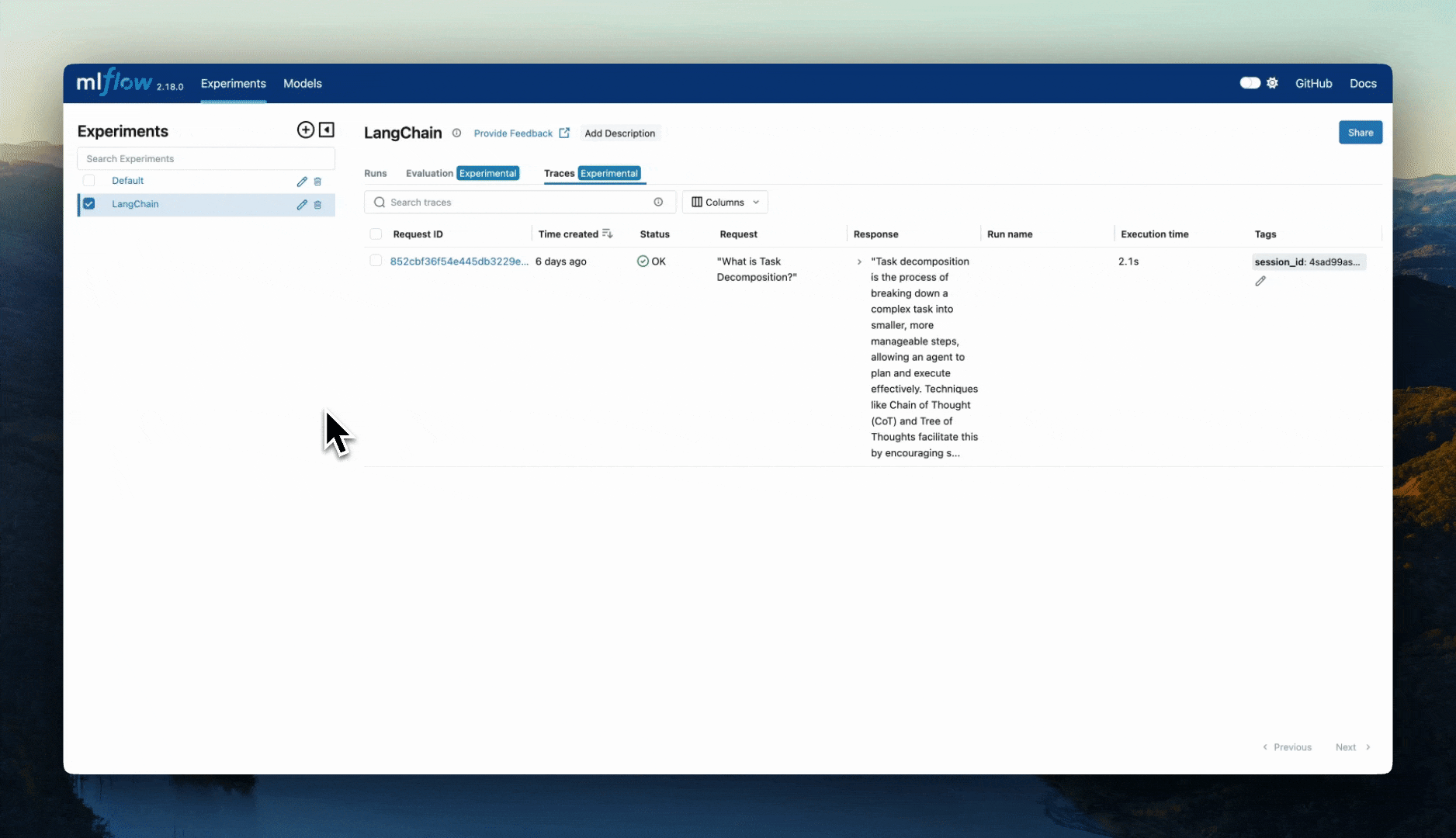Getting Started with MLflow for GenAI
The Complete Open Source LLMOps Platform for Production GenAI
MLflow transforms how software engineers build, evaluate, and deploy GenAI applications. Get complete observability, systematic evaluation, and deployment confidence—all while maintaining the flexibility to use any framework or model provider.

The GenAI Development Lifecycle
MLflow provides a complete platform that supports every stage of GenAI application development. From initial prototyping to production monitoring, these integrated capabilities ensure you can build, test, and deploy with confidence.
Develop & Debug
Trace every LLM call, prompt interaction, and tool invocation. Debug complex AI workflows with complete visibility into execution paths, token usage, and decision points.
Evaluate & Improve
Systematically test with LLM judges, human feedback, and custom metrics. Compare versions objectively and catch regressions before they reach production.
Deploy & Monitor
Serve models with confidence using built-in deployment targets. Monitor production performance and iterate based on real-world usage patterns.
Why Open Source MLflow for GenAI?
As the original open source ML platform, MLflow brings battle-tested reliability and community-driven innovation to GenAI development. No vendor lock-in, no proprietary formats—just powerful tools that work with your stack.
Production-Grade Observability
Automatically instrument 15+ frameworks including OpenAI, LangChain, and LlamaIndex. Get detailed traces showing token usage, latency, and execution paths for every request—no black boxes.
Intelligent Prompt Management
Version, compare, and deploy prompts with MLflow's prompt registry. Track performance across prompt variations and maintain audit trails for production systems.
Automated Quality Assurance
Build confidence with LLM judges and automated evaluation. Run systematic tests on every change and track quality metrics over time to prevent regressions.
Framework-Agnostic Integration
Use any LLM framework or provider without vendor lock-in. MLflow works with your existing tools while providing unified tracking, evaluation, and deployment.
Start Building Production GenAI Applications
MLflow transforms GenAI development from complex instrumentation to simple, one-line integrations. See how easy it is to add comprehensive observability, evaluation, and deployment to your AI applications.
Add Complete Observability in One Line
Transform any GenAI application into a fully observable system:
import mlflow
# Enable automatic tracing for your framework
mlflow.openai.autolog() # For OpenAI
mlflow.langchain.autolog() # For LangChain
mlflow.llama_index.autolog() # For LlamaIndex
mlflow.dspy.autolog() # For DSPy
# Your existing code now generates detailed traces
from openai import OpenAI
client = OpenAI()
response = client.chat.completions.create(
model="gpt-4o-mini",
messages=[{"role": "user", "content": "Explain quantum computing"}],
)
# ✅ Automatically traced: tokens, latency, cost, full request/response
No code changes required. Every LLM call, tool interaction, and prompt execution is automatically captured with detailed metrics.
Manage and Optimize Prompts Systematically
Register prompts and automatically optimize them with data-driven techniques:
import mlflow
from mlflow.genai.optimize import OptimizerConfig, LLMParams
# Register an initial prompt
initial_prompt = mlflow.genai.register_prompt(
name="math_tutor",
template="Answer this math question: {{question}}. Provide a clear explanation.",
)
# Prepare training data for optimization
train_data = [
{"question": "What is 15 + 27?", "expected": "42"},
{"question": "Calculate 8 × 9", "expected": "72"},
# ... more examples
]
# Automatically optimize the prompt using MLflow + DSPy
result = mlflow.genai.optimize_prompt(
target_llm_params=LLMParams(model_name="openai/gpt-4o-mini"),
prompt=initial_prompt,
train_data=train_data,
eval_data=train_data[:5], # Hold-out evaluation set
optimizer_config=OptimizerConfig(
num_instruction_candidates=5, # Try 5 different prompt variations
max_few_shot_examples=3, # Include up to 3 examples
),
)
# The optimized prompt is automatically registered as a new version of the original prompt
optimized_prompt = result.optimized_prompt
print(
f"Optimization improved accuracy from {result.baseline_score:.2f} to {result.optimized_score:.2f}"
)
print(
f"Optimized prompt registered as version {optimized_prompt.version} of '{optimized_prompt.name}'"
)
# Deploy the best-performing version
with mlflow.start_run():
# Use the optimized prompt in your application
model_info = mlflow.openai.log_model(
model="gpt-4o-mini",
task="llm/v1/completions",
name="math_tutor_optimized",
prompts=[optimized_prompt], # Link optimized prompt to model
)
# ✅ Data-driven prompt optimization + automatic versioning + deployment
Transform manual prompt engineering into systematic, data-driven optimization with automatic performance tracking.
Prerequisites
Ready to get started? You'll need:
- Python 3.10+ installed
- MLflow 3.0+ (
pip install --upgrade mlflow) - For prompt optimization: DSPy (
pip install dspy) - API access to an LLM provider (OpenAI, Anthropic, etc.)
Essential Learning Path
Master these core capabilities to build robust GenAI applications with MLflow. Start with observability, then add systematic evaluation and deployment.
Environment Setup
Configure MLflow tracking, connect to registries, and set up your development environment for GenAI workflows
Observability with Tracing
Auto-instrument your GenAI application to capture every LLM call, prompt, and tool interaction for complete visibility
Systematic Evaluation
Build confidence with LLM judges and automated testing to catch quality issues before production
These three foundations will give you the observability and quality confidence needed for production GenAI development. Each tutorial includes real code examples and best practices from production deployments.
Advanced GenAI Capabilities
Once you've mastered the essentials, explore these advanced features to build sophisticated GenAI applications with enterprise-grade reliability.
Prompt Registry & Management
Version prompts, A/B test variations, and maintain audit trails for production prompt management
Automated Prompt Optimization
Automatically improve prompts using DSPy's MIPROv2 algorithm with data-driven optimization and performance tracking
Model Deployment
Deploy GenAI models to production with built-in serving, scaling, and monitoring capabilities
These capabilities enable you to build production-ready GenAI applications with systematic quality management and robust deployment infrastructure.
Framework-Specific Integration Guides
MLflow provides deep integrations with popular GenAI frameworks. Choose your framework to get started with optimized instrumentation and best practices.

LangChain Integration
Auto-trace chains, agents, and tools with comprehensive LangChain instrumentation

LlamaIndex Integration
Instrument RAG pipelines and document processing workflows with LlamaIndex support

OpenAI Integration
Track completions, embeddings, and function calls with native OpenAI instrumentation
DSPy Integration
Build systematic prompt optimization workflows with DSPy modules and MLflow prompt registry
Custom Framework Support
Instrument any LLM framework or build custom integrations with MLflow's flexible APIs
Each integration guide includes framework-specific examples, best practices, and optimization techniques for production deployments.
Start Your GenAI Journey with MLflow
Ready to build production-ready GenAI applications? Start with the Environment Setup guide above, then explore tracing for complete observability into your AI systems. Join thousands of engineers who trust MLflow's open source platform for their GenAI development.